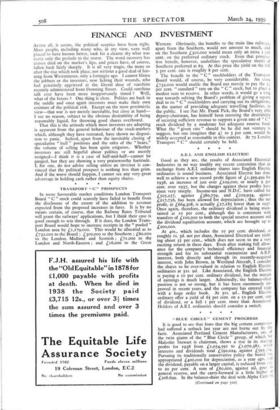TRANSPORT " C " PROSPECTS
In more favourable market conditions London Transport Board " C " stock could scarcely have failed to benefit from the disclosure of the extent of the addition to revenue expected from the proposed increases in fares. It is by no means certain, of course, that the Railway Rates Tribunal will grant the railways' applications, but I think their case is good enough to win through. If it does, the London Trans- port Board would hope to increase receipts in the " pooled " London area by £1,179000. This would be allocated as to £732,000 to the Board ; £300,000 to the Southern ; £60,000 to the London, Midland and Scottish ; £71,000 to the London and North-Eastern ; and L16,000 to the Great Western. Obviously, the benefits to the main line railways, apart from the Southern, would not amount to much, and on the Southern £300,000 would mean only an extra i per cent. on the preferred ordinary stock. Even that prospec- tive benefit, however, underlines the speculative merits of Southern preferred at 63. At this price the yield on the full 5 per cent. rate is roughly 8 per cent.
The benefit to the " C " stockholders of the Transpon Board would, of course, be very considerable. An extra £732,000 would enable the Board not merely to pay the 5; per cent. " standard " rate on the " C " stock, but to place a modest sum to reserve. In other words, it would go a long way towards solving the Board's problem of giving a square deal to its " C " stockholders and carrying out its obligations, in the matter of providing adequate travelling facilities, to the public. I see that Mr. Frank Pick, the Board's very able deputy-chairman, has himself been stressing the desirability of securing sufficient revenue to support a given rate of " C " stock dividend by a moderate but adequate reserve fund. What the "given rate" should be he did not venture to suggest, but one imagines that 41 to 5 per cent. would be widely accepted as reasonable in this context. At 72 London Transport " C " should certainly be held.














































 Previous page
Previous page